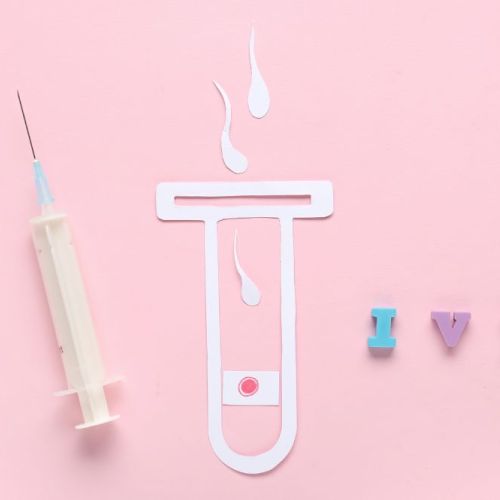How Is Male Infertility Determined?

Male infertility isn’t unusual. In one-third of cases, a man has complications that are making it difficult for a couple to get pregnant. In general, a couple’s infertility is diagnosed when pregnancy hasn’t been achieved after at least one year of trying.
At the California Center for Reproductive Health, we look at all potential causes of infertility in couples. When we diagnose the problem, we can take steps to help you and your partner have a baby.
Men’s fertility basics
First of all, it’s important to recognize that infertility is relatively common. In every 100 couples, 12-13 of them will have trouble getting pregnant. In general, one-third of these instances has to do with issues involving the woman, one-third has to do with the man, and the last third has to do with a combination of problems or undetermined problems.
To successfully conceive a baby, a man’s sperm must fertilize the woman’s egg. This may sound simple, but it’s a complex biological process. Men’s sperm are made in the testicles and then stored inside the epididymis, an area that lies on top of each testicle. Semen nourishes and lubricates these sperm.
When intercourse happens, the man releases, on average, about 150 million sperm in one-half a teaspoon of semen through the penis.
The production of sperm and semen and the process of ejaculation occurs when the man has proper levels of testosterone and other hormones. His nervous system must also be signaling properly to make the whole system flow seamlessly.
Causes of infertility in men
Many issues can contribute to male infertility. A man may have problems with his testicles, a blockage in the ducts that carry sperm to the penis, a hormone imbalance, or a genetic disorder. Lifestyle and environmental factors can also contribute to male infertility as can a history of high fevers or mumps.
Erectile dysfunction, when a man can’t keep or get an erection, can interfere with a man’s ability to release sperm into a woman’s vagina, which can make conception difficult. A man can also have problems with his sperm’s quality or volume. Some sperm may not move as they should and therefore have trouble traveling to fertilize an egg.
Many of these issues can be overcome with the right changes and therapies.
Testing to evaluate male fertility
First, we may give you a medical exam, which may include blood tests and a physical exam. We may also go over your medical history. Furthermore, we may perform a semen analysis to examine the number, shape, health, and movement of your sperm.
Treating male infertility
In many cases, lifestyle changes can help improve a man’s fertility. Reducing stress, keeping the testes at a cool temperature, and eating a healthy diet can all help a man produce optimal sperm.
Restoring hormones, as well as taking medications to address various issues, such as erectile dysfunction, can also help. Your provider may recommend sperm extraction and insemination to increase the chances of conception. In some cases, surgery, such as to clear blocked ducts, may be necessary.
If you and your partner are unable to conceive, we can find out why and help you fulfill your goal of having a child. To learn more, book an appointment online or over the phone with the California Center for Reproductive Health today.
Eliran Mor, MD
Reproductive Endocrinologist located in Encino, Valencia & West Hollywood, CA
FAQ
What does a reproductive endocrinologist and infertility specialist do?
Reproductive endocrinology and Infertility is a sub-specialty of Obstetrics and Gynecology. In addition to managing medical and surgical treatment of disorders of the female reproductive tract, reproductive endocrinologist and infertility (REI) specialists undergo additional years of training to provide fertility treatments using assisted reproductive technology (ART) such as in vitro fertilization.
Reproductive endocrinologists receive board certification by the American Board of Obstetrics and Gynecology in both Obstetrics and Gynecology and Reproductive Endocrinology and Infertility.
When should I see an REI specialist?
In general, patients should consider consulting with an REI specialist after one year of trying unsuccessfully to achieve pregnancy. The chance of conceiving every month is around 20%, therefore after a full year of trying approximately 15% of couples will still not have achieved a pregnancy.
However, if a woman is over the age of 35 it would be reasonable to see a fertility specialist earlier, typically after 6 months of trying.
Other candidates to seek earlier treatment are women who have irregular menses, endometriosis, fibroids, polycystic ovary syndrome (PCOS), women who have had 2 or more miscarriages, or problems with the fallopian tubes (prior ectopic pregnancy).
What are the reasons we are having trouble conceiving?
Approximately 1/3 of the time cause for infertility is a female factor, 1/3 of the time a male factor, and the remaining 1/3 a couples’ factor.
At CCRH, we emphasize the importance of establishing a correct diagnosis. Both partners undergo a comprehensive evaluation including a medical history and physical exam.
Furthremore, the woman’s ovarian reserve is assessed with a pelvic ultrasound and a hormonal profile. A hysterosalpingogram (HSG) will confirm fallopian tube patency and the uterine cavity is free of intracavitary lesions. A semen analysis is also obtained to evaluate for concentration, motility, and morphology of the sperm.
Additional work up is then individualized to direct the best possible treatment option for each couple.
What is IVF? What is the process like?
In vitro fertilization (IVF) is the process that involves fertilization of an egg outside of a woman’s body.
The process starts with fertility drugs prescribed to help stimulate egg development. In your natural cycle, your body is only able to grow one dominant egg, but with stimulation medication we can recruit multiple eggs to continue to grow. After about 8-10 days of stimulation, the eggs are surgically retrieved and then fertilized with sperm in a specialized laboratory. Fertilized eggs are then cultured under a strictly controlled environment within specialized incubators in the IVF laboratory for 3-5 days while they develop as embryos. Finally, embryos (or an embryo) are transferred into the uterine cavity for implantation.
Should I have IVF?
Before deciding if IVF is the right choice, it’s important to sit down with an REI specialist to discuss available treatment options. For some people, other methods such as fertility drugs, intrauterine insemination (IUI) may be the best first choice treatment. At CCRH, we believe each individual couple is unique and not everyone needs IVF.
Is the IVF procedure painful?
While not painful, the fertility medications may some side effects including headaches, hot flashes, mood swings, and bloating. The injection sites may also bruise.
Will IVF guarantee a baby?
Unfortunately, no. Many people think once they start IVF it’s a matter of time that they will be pregnant and have a baby. But according to national statistics per the Society of Assisted Reproduction (SART), on average 40% of assisted reproduction cycles achieve live births in women under age 35. The chances of success then continue to decrease with advancing age.
At CCRH, we employ only evidence-based interventions to ensure patient safety and optimal outcome. While we cannot guarantee a baby, we guarantee that you will receive the best, most advanced, personalized care to help you maximize your chance of a baby.
What is the success rate for IVF?
The average IVF success rate (success measured in live birth rate) using one’s own eggs begins to drop around age 35 and then rapidly after age 40. This is due to the decline in egg quantity and egg quality as a woman ages.
Our clinic’s success rate consistently beats the national average year after year.
Do insurance plans cover infertility treatment? How much does IVF cost?
Individual insurance plans often do not have any coverage for infertility treatments. If you have a group plan, you can call members services to see if they have coverage for infertility (including consultation/workup and IVF).
After your consultation with our REI specialist, one of our dedicated account managers with sit with you to go over the cost of treatment.




